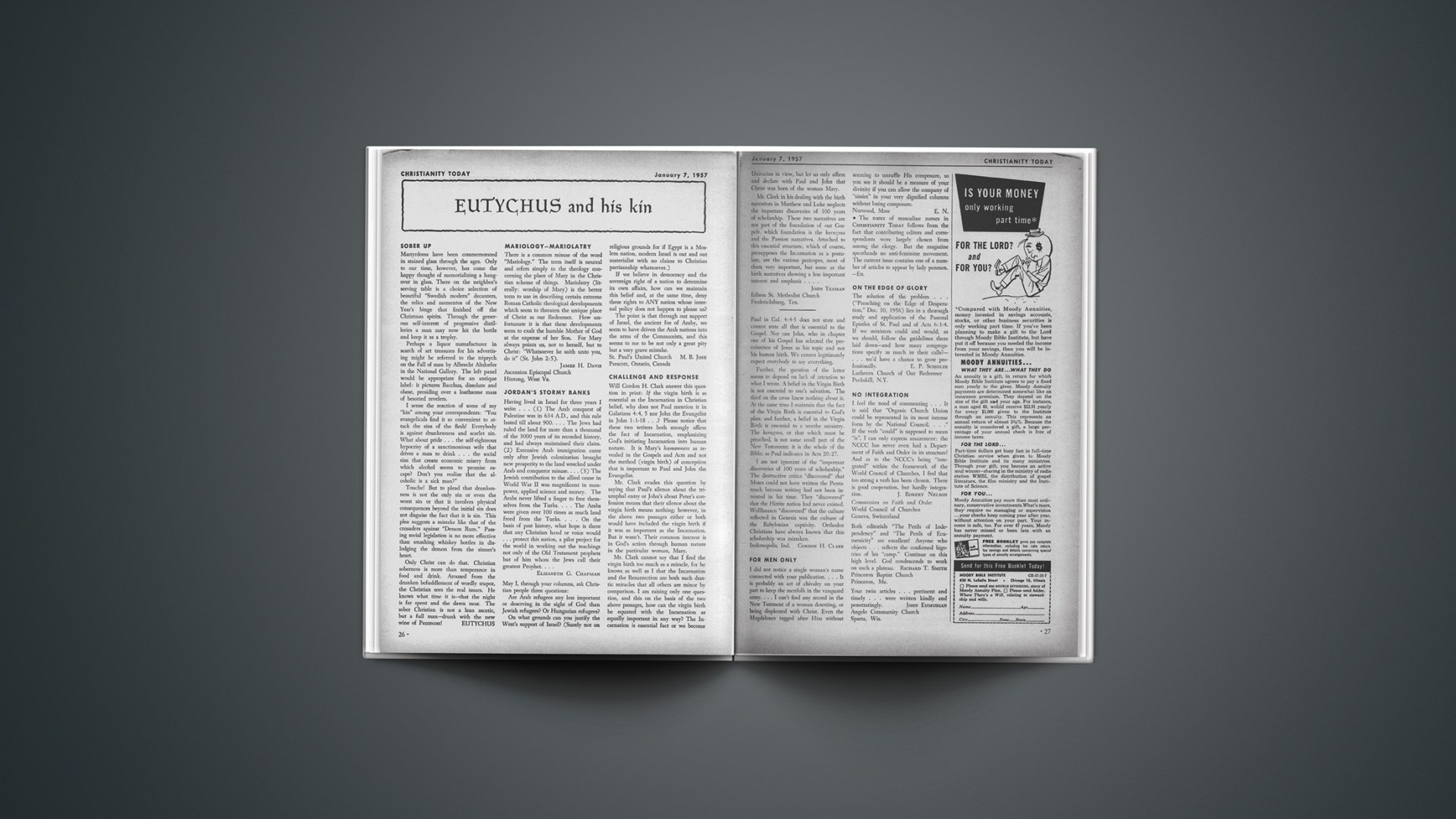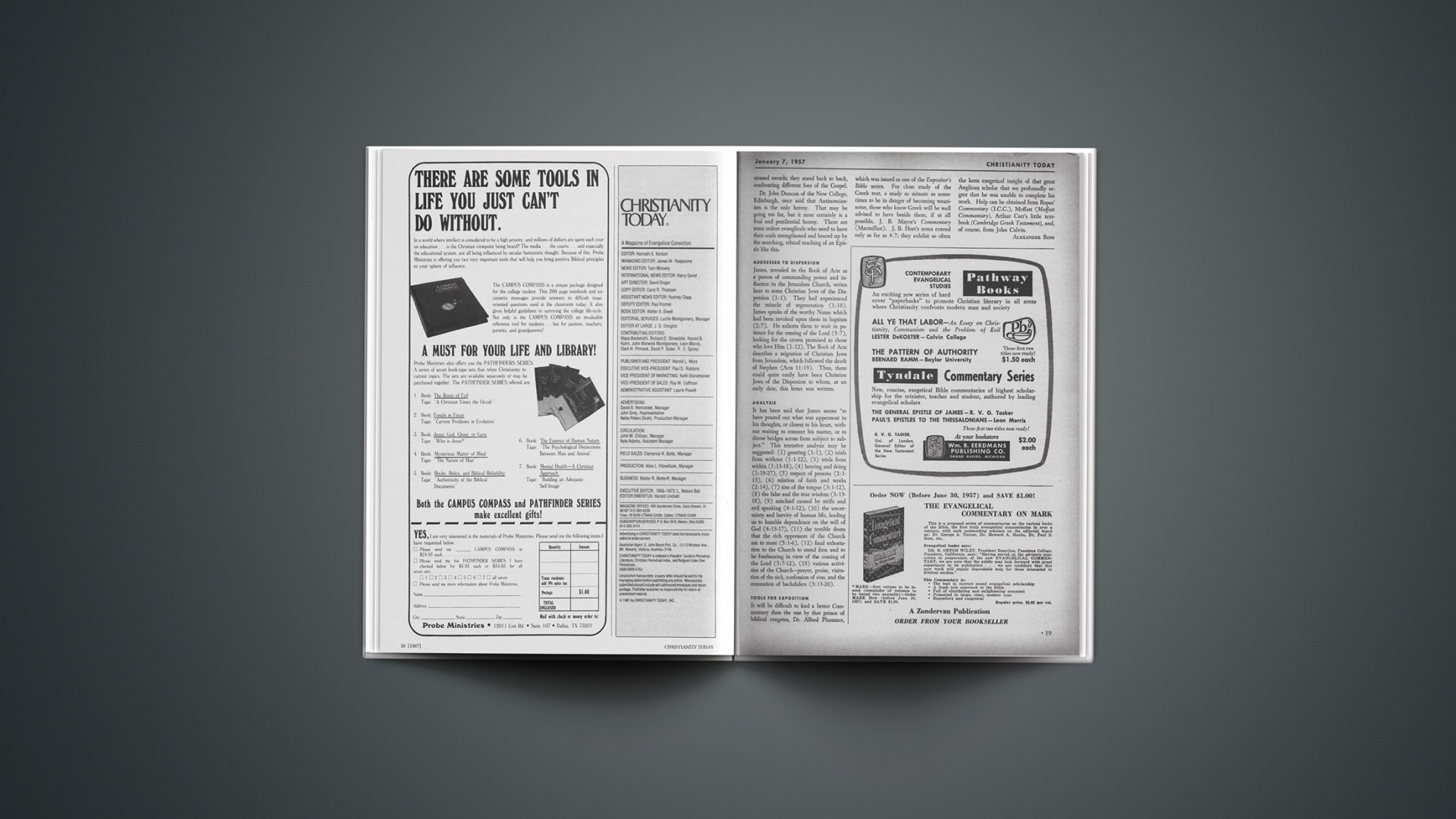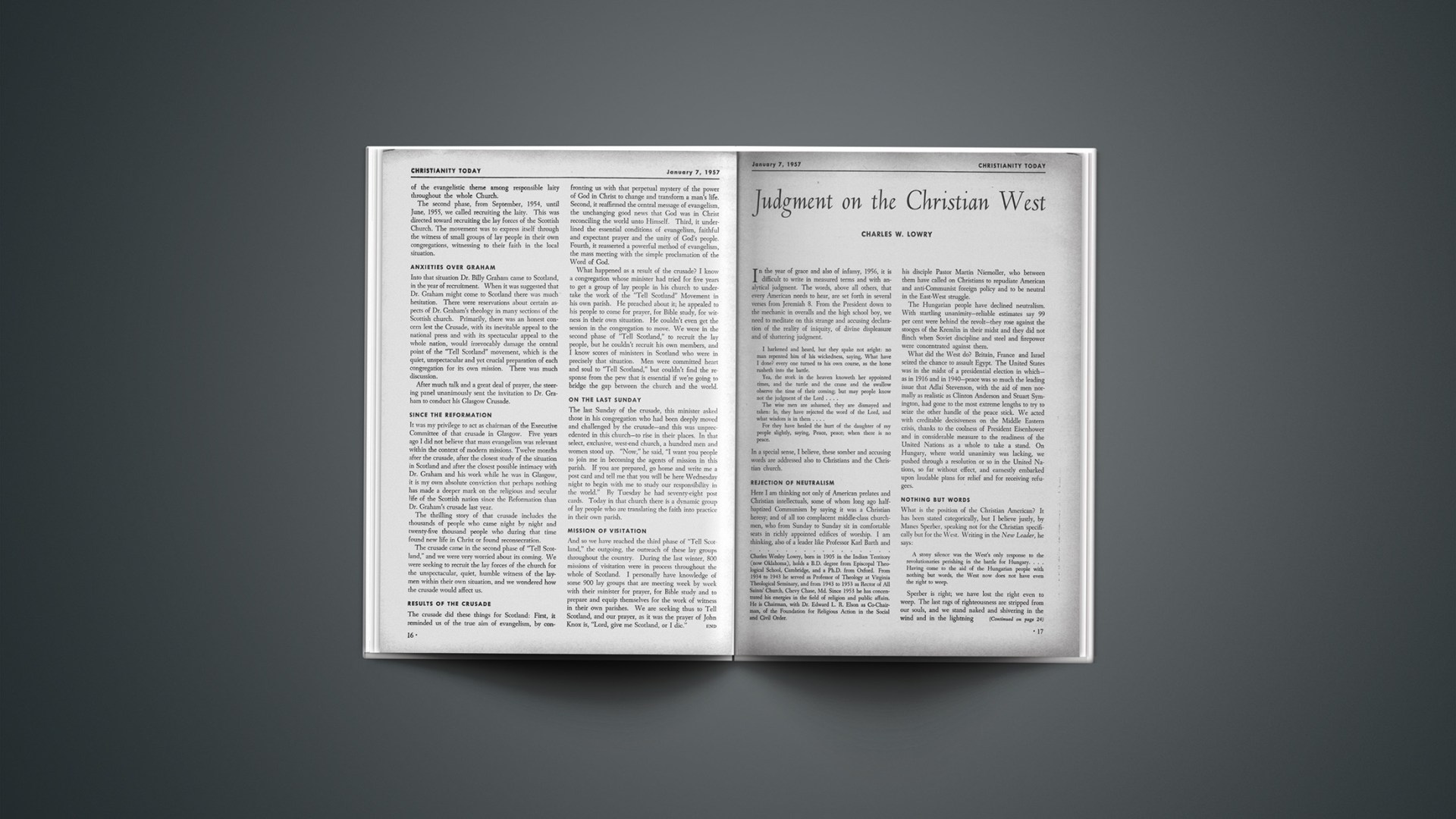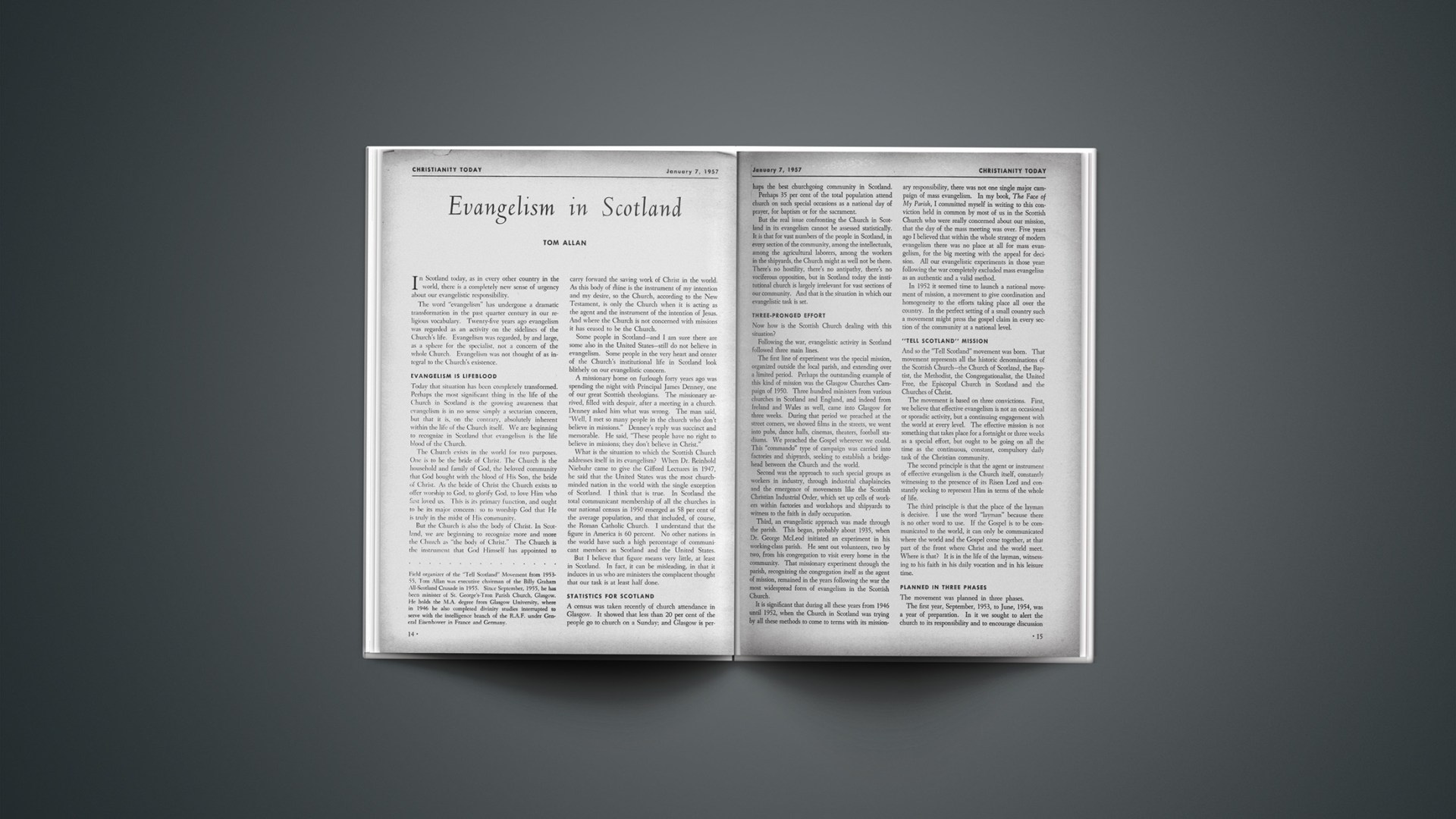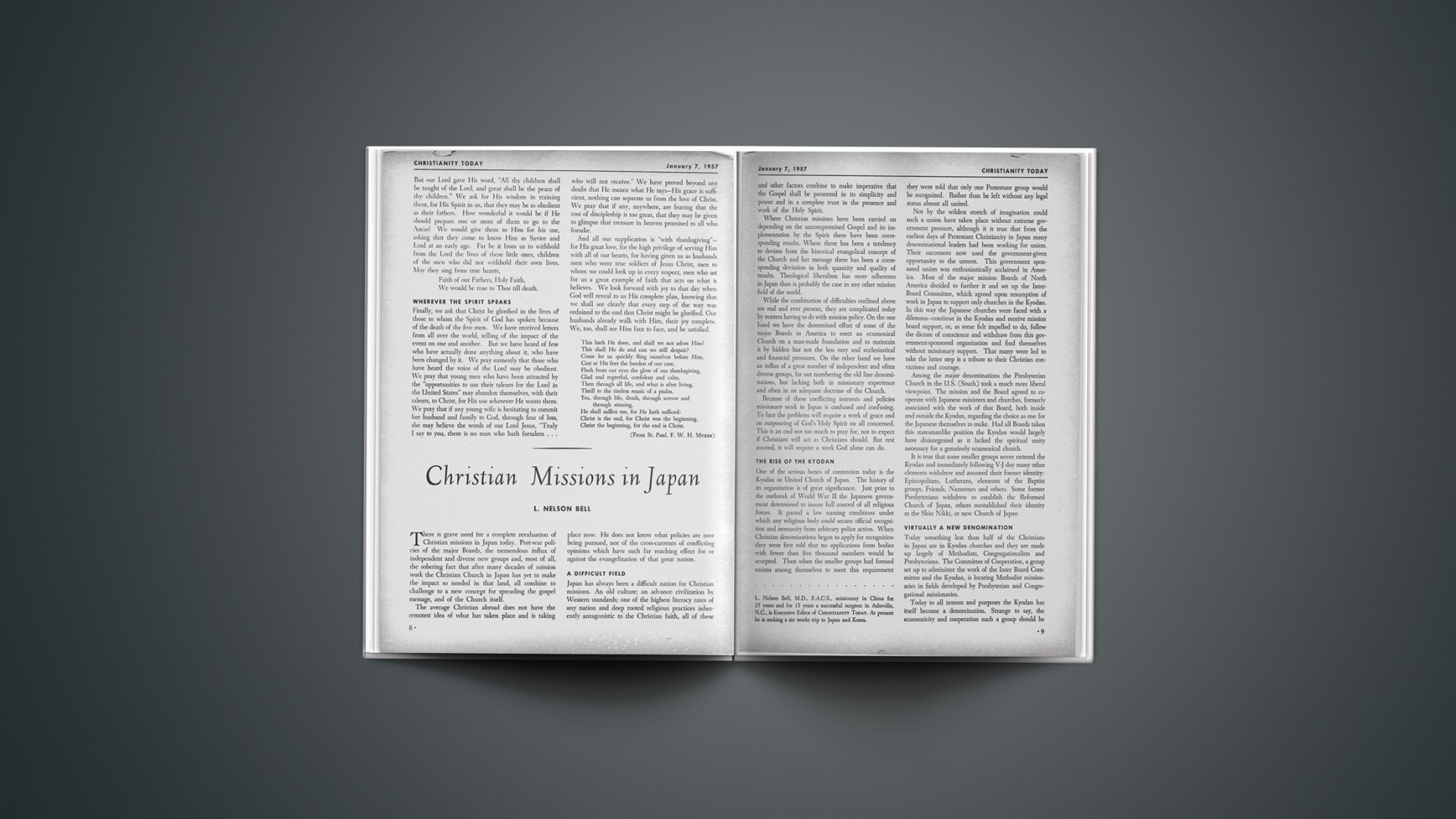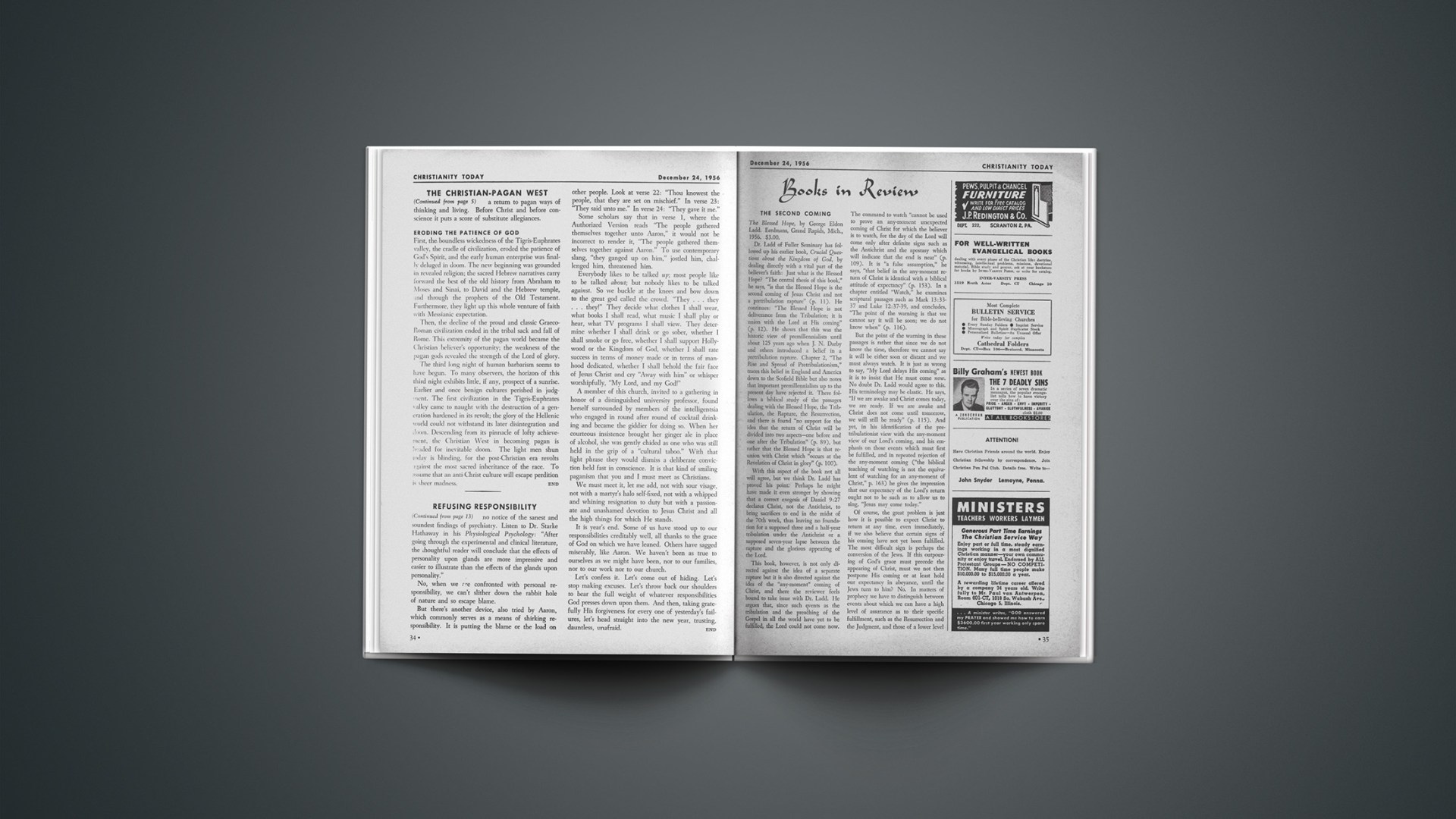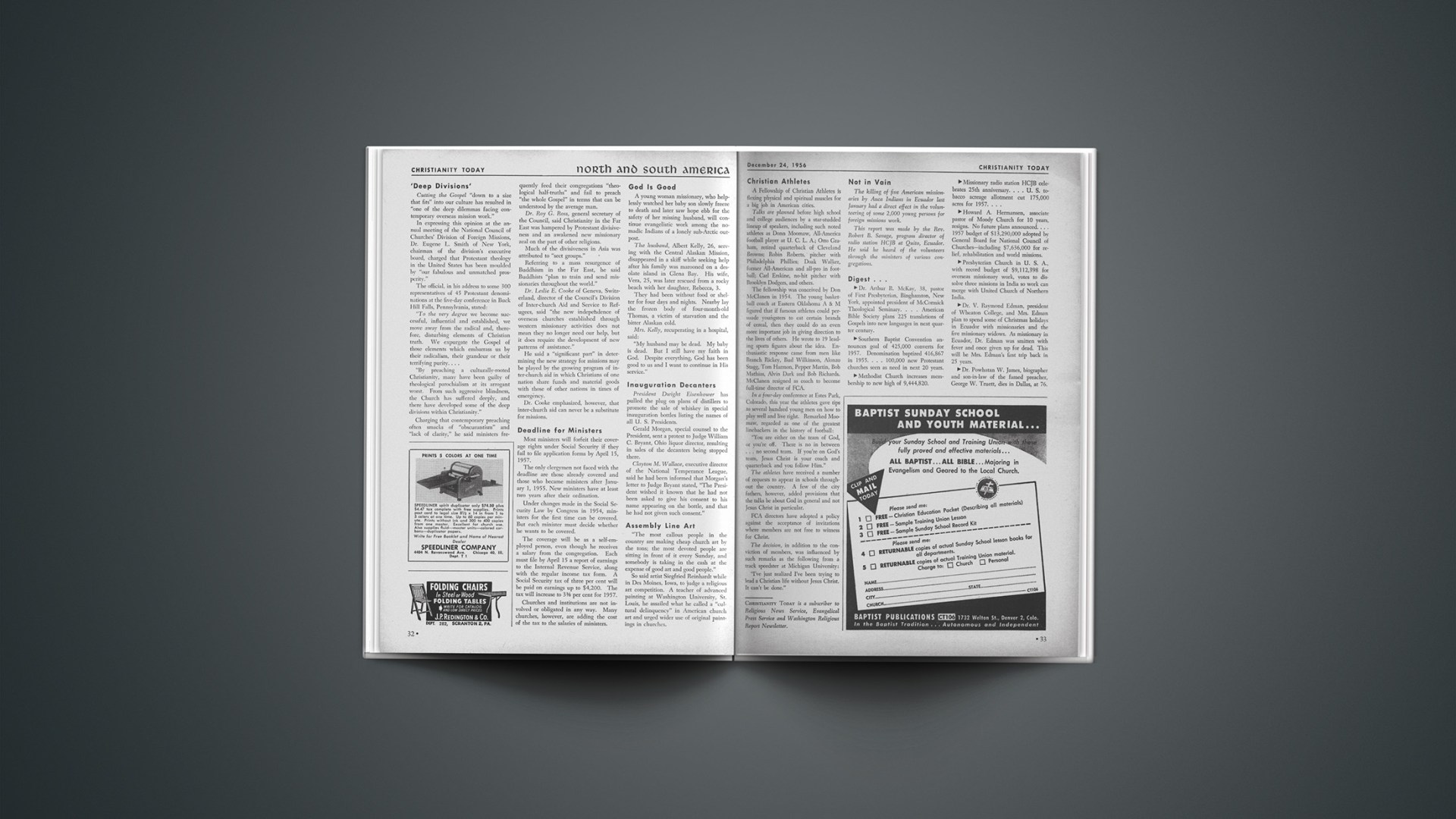SOBER UP
Martyrdoms have been commemorated in stained glass through the ages. Only to our time, however, has come the happy thought of memorializing a hangover in glass. There on the neighbor’s serving table is a choice selection of beautiful “Swedish modern” decanters, the relics and mementos of the New Year’s binge that finished off the Christmas spirits. Through the generous self-interest of progressive distilleries a man may now hit the bottle and keep it as a trophy.
Perhaps a liquor manufacturer in search of art treasures for his advertising might be referred to the triptych on the Fall of man by Albrecht Altdorfer in the National Gallery. The left panel would be appropriate for an antique label: it pictures Bacchus, dissolute and obese, presiding over a loathsome mass of besotted revelers.
I sense the reaction of some of my “kin” among your correspondents: “You evangelicals find it so convenient to attack the sins of the flesh! Everybody is against dmnkenness and scarlet sin. What about pride … the self-righteous hypocrisy of a sanctimonious wife that drives a man to drink … the social sins that create economic misery from which alcohol seems to promise escape? Don’t you realize that the alcoholic is a sick man?”
Touche! But to plead that drunkenness is not the only sin or even the worst sin or that it involves physical consequences beyond the initial sin does not disguise the fact that it is sin. This plea suggests a mistake like that of the crusaders against “Demon Rum.” Passing social legislation is no more effective than smashing whiskey bottles in dislodging the demon from the sinner’s heart.
Only Christ can do that. Christian soberness is more than temperance in food and drink. Aroused from the drunken befuddlement of wordly stupor, the Christian sees the real issues. He knows what time it is—that the night is far spent and the dawn near. The sober Christian is not a lean ascetic, but a full man—drunk with the new wine of Pentecost!
EUTYCHUS
MARIOLOGY-MARIOLATRY
There is a common misuse of the world “Mariology.” The term itself is neutral and refers simply to the theology concerning the place of Mary in the Christian scheme of things. Mariolatry (literally: worship of Mary) is the better term to use in describing certain extreme Roman Catholic theological developments which seem to threaten the unique place of Christ as our Redeemer. How unfortunate it is that these developments seem to exalt the humble Mother of God at the expense of her Son. For Mary always points us, not to herself, but to Christ: “Whatsoever he saith unto you, do it” (St. John 2:5).
JAMES H. DAVIS
Ascension Episcopal Church
Hintong, West Va.
JORDAN’S STORMY BANKS
Having lived in Israel for three years I write … (1) The Arab conquest of Palestine was in 634 A.D., and this rule lasted till about 900.… The Jews had ruled the land for more than a thousand of the 3000 years of its recorded history, and had always maintained their claim. (2) Extensive Arab immigration came only after Jewish colonization brought new prosperity to land wrecked under Arab and conqueror misuse.… (3) The Jewish contribution to the allied cause in World War II was magnificent in man-power, applied science and money. The Arabs never lifted a finger to free themselves from the Turks.… The Arabs were given over 100 times as much land freed from the Turks.… On the basis of past history, what hope is there that any Christian hand or voice would … protect this nation, a pilot project for the world in working out the teachings not only of the Old Testament prophets but of him whom the Jews call their greatest Prophet.…
ELIZABETH G. CHAPMAN
May I, through your columns, ask Christian people three questions:
Are Arab refugees any less important or deserving in the sight of God than Jewish refugees? Or Hungarian refugees?
On what grounds can you justify the West’s support of Israel? (Surely not on religious grounds for if Egypt is a Moslem nation, modern Israel is out and out materialist with no claims to Christian partisanship whatsoever.)
If we believe in democracy and the sovereign right of a nation to determine its own affairs, how can we maintain this belief and, at the same time, deny these rights to ANY nation whose internal policy does not happen to please us?
The point is that through our support of Israel, the ancient foe of Araby, we seem to have driven the Arab nations into the arms of the Communists, and this seems to me to be not only a great pity but a very grave mistake.
M. B. JOSE
St. Paul’s United Church
Prescott, Ontario, Canada
CHALLENGE AND RESPONSE
Will Gordon H. Clark answer this question in print: If the virgin birth is as essential as the Incarnation in Christian belief, why does not Paul mention it in Galatians 4:4, 5 nor John the Evangelist in John 1:1–18 …? Please notice that these two writers both strongly affirm the fact of Incarnation, emphasizing God’s initiating Incarnation into human nature. It is Mary’s humanness as revealed in the Gospels and Acts and not the method (virgin birth) of conception that is important to Paul and John the Evangelist.
Mr. Clark evades this question by saying that Paul’s silence about the triumphal entry or John’s about Peter’s confession means that their silence about the virgin birth means nothing; however, in the above two passages either or both would have included the virgin birth if it was as important as the Incarnation. But it wasn’t. Their common interest is in God’s action through human nature in the particular woman, Mary.
Mr. Clark cannot say that I find the virgin birth too much as a miracle, for he knows as well as I that the Incarnation and the Resurrection are both such drastic miracles that all others are minor by comparison. I am raising only one question, and this on the basis of the two above passages, how can the virgin birth be equated with the Incarnation as equally important in any way? The Incarnation is essential fact or we become Unitarian in view, but let us only affirm and declare with Paul and John that Christ was born of the woman Mary.
Mr. Clark in his dealing with the birth narratives in Matthew and Luke neglects the important discoveries of 100 years of scholarship. These two narratives are not part of the foundation of our Gospels, which foundation is the kerugma and the Passion narratives. Attached to this essential structure, which of course, presupposes the Incarnation as a postulate, are the various pericopes, most of them very important, but some as the birth narratives showing a less important interest and emphasis.…
JOHN YEAMAN
Edison St. Methodist Church
Fredericksburg, Tex.
Paul in Gal. 4:4–5 does not state and cannot state all that is essential to the Gospel. Nor can John, who in chapter one of his Gospel has selected the preexistence of Jesus as his topic and not his human birth. We cannot legitimately expect everybody to say everything.
Further, the question of the letter seems to depend on lack of attention to what I wrote. A belief in the Virgin Birth is not essential to one’s salvation. The thief on the cross knew nothing about it. At the same time I maintain that the fact of the Virgin Birth is essential to God’s plan; and further, a belief in the Virgin Birth is essential to a worthy ministry. The kerugma, or that which must be preached, is not some small part of the New Testament: it is the whole of the Bible; as Paul indicates in Acts 20:27.
I am not ignorant of the “important discoveries of 100 years of scholarship.” The destructive critics “discovered” that Moses could not have written the Pentateuch because writing had not been invented in his time. They “discovered” that the Hittite nation had never existed. Wellhausen “discovered” that the culture reflected in Genesis was the culture of the Babylonian captivity. Orthodox Christians have always known that this scholarship was mistaken.
GORDON H. CLARK
Indianapolis, Ind.
FOR MEN ONLY
I did not notice a single woman’s name connected with your publication.… It is probably an act of chivalry on your part to keep the menfolk in the vanguard army.… I can’t find any record in the New Testment of a woman deserting, or being displeased with Christ. Even the Magdalenes tagged after Him without seeming to unruffle His composure, so you see it should be a measure of your divinity if you can allow the company of “sissies” in your very dignified columns without losing composure.
E. N.
Norwood, Mass
The roster of masculine names in CHRISTIANITY TODAY follows from the fact that contributing editors and correspondents were largely chosen from among the clergy. But the magazine spearheads no anti-feminine movement. The current issue contains one of a number of articles to appear by lady penmen.
—ED.
ON THE EDGE OF GLORY
The solution of the problem … (“Preaching on the Edge of Desperation,” Dec. 10, 1956) lies in a thorough study and application of the Pastoral Epistles of St. Paul and of Acts 6:1–4. If we ministers could and would, as we should, follow the guidelines there laid down—and how many congregations specify as much in their calls?—… we’d have a chance to grow professionally.
E. P. SCHULZE
Lutheran Church of Our Redeemer
Peekskill, N.Y.
NO INTEGRATION
I feel the need of commenting … It is said that “Organic Church Union could be represented in its most intense form by the National Council.…” If the verb “could” is supposed to mean “is”, I can only express amazement: the NCCC has never even had a Department of Faith and Order in its structure! And as to the NCCC’s being “integrated” within the framework of the World Council of Churches, I feel that too strong a verb has been chosen. There is good cooperation, but hardly integration.
J. ROBERT NELSON
Commission on Faith and Order
World Council of Churches
Geneva, Switzerland
Both editorials “The Perils of Independency” and “The Perils of Ecumenicity” are excellent! Anyone who objects … reflects the confirmed bigotries of his “camp.” Continue on this high level. God condescends to work on such a plateau.
RICHARD T. SMITH
Princeton Baptist Church
Princeton, Me.
Your twin articles … pertinent and timely … were written kindly and penetratingly.
JOHN EUMURIAN
Angelo Community Church
Sparta, Wis.

